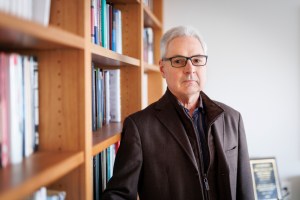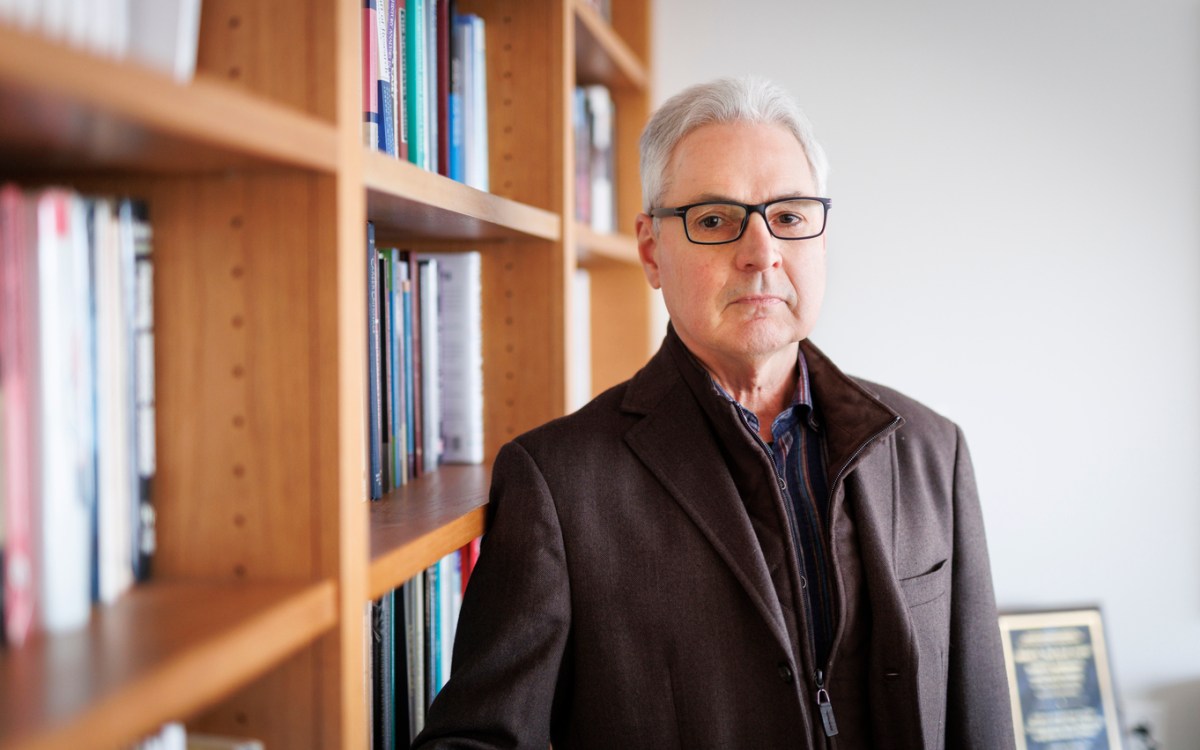
Robert Waldinger.
Harvard file photo
Things money can’t buy — like happiness and better health
That’s according to the Harvard Study of Adult Development, which over its 87-year run has generated data that benefits work on other issues
Money can’t buy happiness, but strong relationships can. And having those ties can bring better health, too.
That is the main lesson from the Harvard Study of Adult Development, one of the world’s longest in-depth studies of physical and mental health among adults, said its director, Robert Waldinger, a professor of psychiatry at Harvard Medical School and a psychiatrist at Massachusetts General Hospital.
In its 87th year, the longitudinal study represents the world’s longest-running scientific examination of human health and happiness. It began in 1938 with 724 participants and has grown to 2,500, including the wives and descendants of the original participants.
“The lessons aren’t about wealth, or fame, or working harder and harder,” said Waldinger in a 2015 TED Talk that has been viewed nearly 50 million times.
”The clearest message is this: Good relationships keep us happier and healthier.”
“The clearest message is this: Good relationships keep us happier and healthier. Period … It turns out that people who are more socially connected to family, to friends, to community, are happier; they are physically healthier and live longer than people who are less well connected.”
The data collected by the study over decades, consisting of medical records, brain scans, in-person interviews and questionnaires, is a treasure trove of information that can be used for research beyond that of Waldinger’s group.
As of now, the Harvard Study is collaborating with researchers from the Boston Veterans Administration, Northwestern University, University of Malmo in Sweden, and Bryn Mawr College.
One of those collaborations looks at lead exposure in childhood, through air and water, and its potential impact on physical and mental health by using the study’s data on participants and the neighborhoods where they grew up, including lead exposure, and their physical and mental well-being throughout their lives.
This collaborative study also aims to examine whether long-term effects of exposure to lead affect levels of juvenile delinquency, dropping out of school, or developing dementia later in life.
Over the years, the study has been funded primarily by grants from the National Institutes of Health, and since 2003 by grants from the National Institute on Aging.
The Harvard Study has not been affected by the Trump administration’s recent funding cuts, but the cuts pose a threat to long-term research, which can only be supported by government funding, said Waldinger.
“So many foundations will do a pilot grant,” said Waldinger. “But then they don’t want to keep funding something for eight decades, understandably, but the government can take on these longer, big projects. The government is the only funding source likely to do that.”
In the Harvard Study’s case, federal funding has covered participant testing and compensation and salaries of research assistants, who do in-person visits or phone calls, and collect and store data.
But another key benefit of federal-funding projects is that they help train young scientists who will go on to lead research discoveries, said Waldinger.
“Many of our most important discoveries are discoveries that happen because people were investigating an area that didn’t necessarily have a direct practical application when they started studying it, and then they discovered things that turn out to be hugely important things.”
Longitudinal research, or studying people over time, is a specialized kind of study that requires special statistical techniques. Over the years, dozens of undergraduate students, Ph.D. candidates, postdoctoral fellows, and junior faculty have been trained by the Harvard Study, he said.
Critics are concerned the recent funding cuts might discourage young scientists from going into research. Even if the funds are restored in the next administration, the pipeline of researchers will have been disrupted, said Waldinger. Some of his students no longer see research as a reliable career, and many are going into clinical work or business, he added, but the effects on the country’s position as a global leader in scientific research and discoveries are worrisome as well.
“My biggest worry is that we will stop being the premier place for research,” said Waldinger.
“Many of our most important discoveries are discoveries that happen because people were investigating an area that didn’t necessarily have a direct practical application when they started studying it, and then they discovered things that turn out to be hugely important things.”
In addition, much of the research has fueled economic innovation over the decades, and funding cuts also put those advances in jeopardy. “So even if you were just interested in money and not in knowledge and science, you would say, this is a really important thing to continue, and we should never lose this, or we will lose our advantage economically,” he said.




